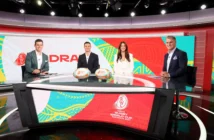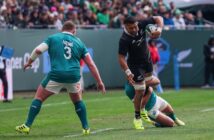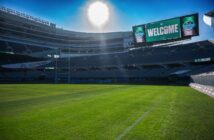Martin O’Neill and Roy Keane stepped away from their roles as manager and assistant manager of the Republic of Ireland national team this week, to a collective local sigh of relief.
In truth, though, there’s an argument to be made that the pair have substantially overachieved. Since O’Neill took over in 2013, his Ireland side have qualified for a major European tournament, in Euro 2016 (only Ireland’s sixth major tournament in their history), and overseen major wins against Germany and Italy. Ireland also made it to a two-leg play off against Denmark for a place at the 2018 World Cup, and got a creditable draw away in Copenhagen. The side even led in 1-0 in Dublin last year, before being overrun by the talented Danes by a margin of 5-1 and dumped out.
When considering those achievements, it’s worth noting that the Republic has a population of less than 5 million (though players are often drawn from the large diaspora, particularly in England). Soccer is not the main game: it’s rivaled by rugby, and overwhelmed in terms of regular playing numbers by Gaelic football and hurling. Most fans prefer to watch the English Premier League to their home-grown version. The side’s stand out modern-day players are Seamus Coleman, an extremely solid Everton full back, and combative midfielder James McClean. While there have been some high-profile recent retirees, weakening the side, the current best starting eleven would contain almost as many players drawn from England’s second tier as its top flight. In truth, while it’s an international team, it would probably struggle to maintain a place in England’s top flight.
So why the issues with O’Neill?
Ultimately, it’s a question of style. There’s a clear sense that the current Ireland team don’t know how to win games, and aim primarily not to lose them. There’s been the odd victory over weak sides, but 2018 contests – which have seen the wins all but dry up – probably sum up the issue. In nine games (one win), the team have managed only four goals, two of them against a disappointing USA in Dublin. In competitive games in the newly formed UEFA National League, they’ve scored only the one goal, in a 4-1 loss to Wales in Cardiff. They might have conceded relatively few, too (there have been three 0-0 draws), but there’s a growing sense that this side just aren’t worth watching, born out in the dull-as-dishwater stalemate with Northern Ireland last week, where the politics was more interesting than the game.
Keane, O’Neill’s assistant and former Manchester United midfield battering ram, has been a divisive figure in Ireland since he stormed out of the national camp prior to the 2002 World Cup. Keane slammed manager Mick McCarthy as he went, complaining about the team’s training facilities. Some backed him, though most saw him as a fool when Ireland made the last 16 in his absence.
Matt Doherty, a key man at Wolves and one of Ireland’s best attacking assets on paper, has summed up the issues as he turned on O’Neill this week in an interview with RTE Sport.
“Everyone thinks there wasn’t a game plan every time, that’s not entirely true. Sometimes there was, sometimes it was less clear,” he said.
“Compared to the set-up I have at Wolves, you could class it as old-school. When you were away with Ireland, you didn’t really have that much coaching. It was more of five-a-side, or 11-a-side game, and that would be it.”
“The day before a game you would do a few set-pieces here and there and then go into the game. You are kind of thinking to yourself, ‘what shape are we going to play?’
“You’d have a few players thinking ‘we’ll play this shape’, or someone else thinking something else. You can’t have that, especially at international football, people not really sure on what their role is the next day.”
Doherty added that Keane “Didn’t really do anything.”
Fans point to a number of issues with the team that the new boss will need to sort out. The conveyor belt of talent through the much maligned local league, the League of Ireland, is actually stronger than most Irish fans give it credit for, but is not going to produce a high class team in its own right. Players of mixed nationality – traditionally a strong source for the Irish ranks – are starting to turn their back, with young talents Jack Grealish (a sure-fire Irish starter who’s chosen instead to wait on an England call up that’s yet to arrive) and Declan Rice (who’s sitting firmly on the same English-Irish fence) both looking lost causes. There’s a clear absence of high-class attacking talent.
O’Neill and Keane’s era was one of grit, professionalism, and grinding out results on limited resources. The consensus, it seems, is Irish fans have had enough of the deep-dive defensive approach, and are voting with their feet. Ireland fans are realistic: whoever comes next can afford to lose. In fact, in some games it’s fair to say it will be expected. If the national team’s recent poor image is to recover, though, they’ll have to be substantially more expansive.
The aforementioned Mick McCarthy currently fronts the running to take over the side for a second time.
Relatively recently sacked by long term employer Ipswich Town, there’s been mixed reactions amongst Ireland fans: Ipswich weren’t exactly a fluent attacking unit under McCarthy, either.
After a year of drudgery, ‘entertain us’, comes the call. Not too many tears have been shed in Ireland over the twin departure this week. Given resources, entertainment, though, could remain a tough ask.
![Prost International [PINT]](https://prostinternational.com/wp-content/uploads/2021/08/PINTtFontLogoRoboto1536x78.jpg)



